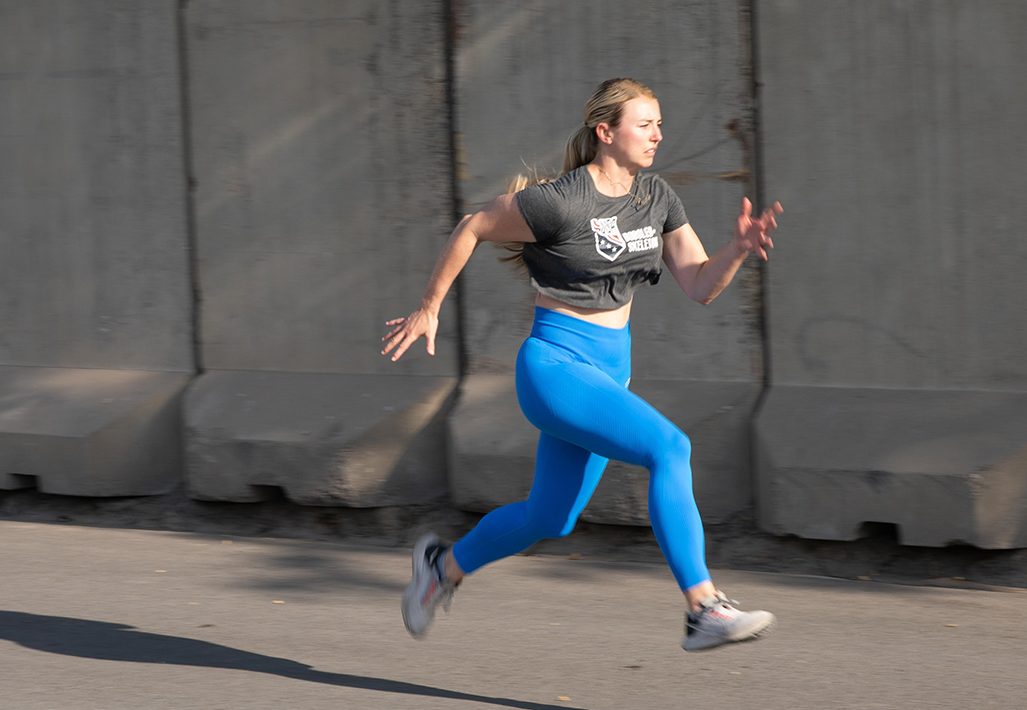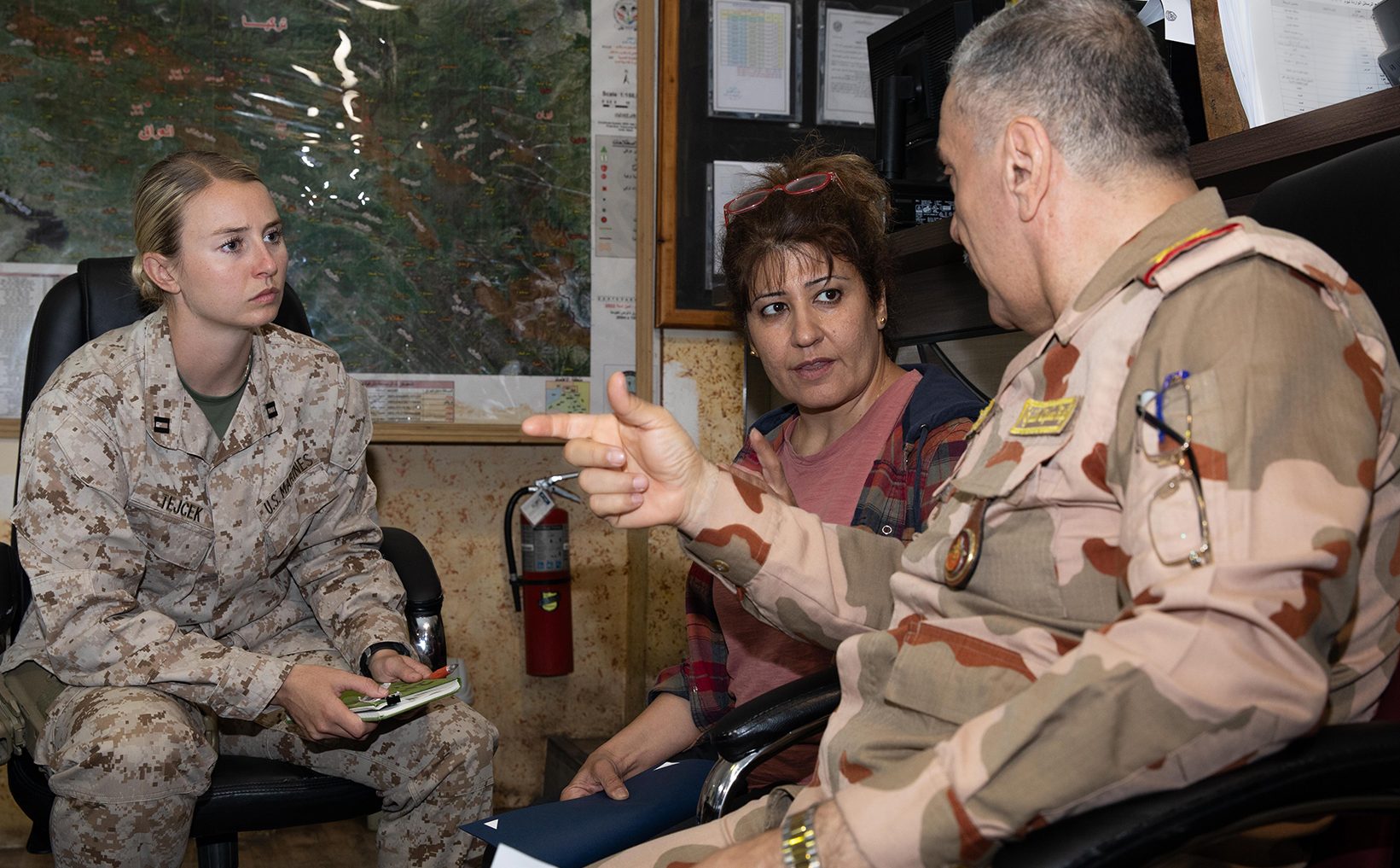
BAGHDAD – The Paris games may be over, but Marine Capt. Riley Tejcek is already training for the 2026 winter Olympics, even while deployed to Iraq, one of the hottest countries in the world.
Tejcek, 27, is already the first female Marine to be part of a world championship Bobsled team. Now she has set her sights on the U.S. Olympic Bobsled team for the 2026 games in Italy. As a Marine, she is in Baghdad as a logistics officer supporting Operation Inherent Resolve, the U.S.-led mission to defeat the Islamic State group in Iraq and Syria.
She also faces a handicap some other would-be military Olympians don’t: unlike the Army and Air Force, the Navy and Marine Corps do not have a specific program for Olympic hopefuls to train full-time. Would-be Olympic Marines and sailors must train on their own while in the fleet.
To meet that, Tejcek’s routine in Iraq includes 90 minutes of intense physical training everyday on top of 15-hour workdays.
“How I’ve been able to deconflict is knowing where my priorities are: I’m a Marine first, and that was my No. 1 priority,” Tejcek told Task & Purpose in June. “However, the Marine Corps has been extremely supportive in allowing me to continue to pursue bobsled as I’ve competed in two world championships, made the national team, and have been the first female Marine to compete in world championships, trying to be the first female Marine to compete in the Olympics.”
Tejeck competes in one- and two-person teams. The event begins with racers pushing their bobsled, which weighs 400 pounds or more, down a narrow ice-covered track built specifically for the sleds. Tejcek is a bobsled pilot, so her job is to navigate corners and turns at up to 100 miles per hour and avoid crashing into walls. In addition to her physical training, she often views videos of various courses to memorize each turn.
Subscribe to Task & Purpose today. Get the latest military news and culture in your inbox daily.
It’s an extremely dangerous sport, but as a self-confessed “adrenaline junkie,” Tejcek likes that the stakes are so high.
“We have done a lot of scientific research that shows every single run we go to, we experience 5Gs, minimally, which is very similar to fighter pilots,” Tejcek said. “So, I do that multiple times a day; several times in competition. And then when you crash, you actually can experience up to 45Gs due to the head trauma against the ice and moving that quickly. So, I’ve had my fair share of that.”

As much as Tejcek wants to compete in the Olympics, she still volunteered to deploy to Iraq, even though it meant she would miss three Bobsled competitions this fall.
“When I joined the Marine Corps – and like a lot of people when they join the military – I joined to be able to deploy and make a difference,” Tejcek said. “I have been blessed in my Marine Corps career to have opportunities and experiences that a lot of people have not because of bobsled. But what I felt like what I was missing when I was speaking at schools and universities and recruiting people to come in the armed forces was the fact that I didn’t have a deployment under my belt.”
For Tejcek, when an opportunity arose to go to Iraq as an operations officer – a billet that had previously been held by a lieutenant colonel – she decided it was worth the risk to her chances of making the U.S. Olympic Bobsled team.
“Timing is never going to be perfect in anything we do in life,” she said. “This is an experience of a lifetime I just didn’t want to miss in my professional career,”
Originally from Carmel, Indiana, Tejek cites her strong religious faith as her secret to being able to serve her country while simultaneously going through the rigorous preparations for the Olympics – all with a broken foot that never properly healed.
The other Olympic hopefuls are currently at a training center, where they spend all their time getting ready for the next games, she said. They also have access to chiropractors and other treatment options that she does not.
But iron sharpens iron and Tejecek believes the challenges of training in Baghdad’s oppressive heat with poor air quality has made Tejcek a better athlete.
“I’ve been really focusing on trying to actually use it as a tactical mental advantage, honestly, knowing that the people I am competing with around the world have it much ‘easier’ than I do in terms of their surroundings and the circumstances they’re in,” Tejcek said. “It makes me feel like I already have an edge on them mentally.”

Daytime temperatures in Iraq can exceed 120 degrees, so Tejcek does her rigorous physical training early in the morning, when it is slightly cooler. Her training involves a lot of short sprints for power and explosive lifts, including power cleans, quick squats, jumps, and plyometrics. She runs both outside as well on treadmills for hills.
Running on especially hot days can be extremely fatiguing, and not having access to a track means she must run without the spikes on her shoes that she would use on the ice for pushing the bobsled. The concrete surfaces that she runs on can also aggravate her old foot injury.
“It makes it difficult to run on concrete with speed bumps around and having your weapon within a certain radius and try to worry about no one taking that,” she said with a laugh.
Adding to the difficulties she faces, Tejcek has found that her Marine Corps physical training is often at odds with her bobsled training.
“What the Marine Corps demands of me physically is very opposite of bobsled,” Tejcek explained. “So, bobsled wants me to be big, fast, quick, and explosive. The Marine Corps wants me to be lean, mean, and a fighting machine, and they want me to be able to run three miles in 21 minutes. Whereas bobsled wants me to be able to run 20 meters in a very short amount of time and be heavy, big, and powerful. Those don’t always overlap – slow-twitch vs. fast -twitch muscle fibers.”
Tejeck lost 10 pounds preparing for her physical fitness test before she deployed, and now she is trying to put on muscle.
Unlike the Army and Air Force, the Marine Corps does not have a World Class Athlete Program, which prepares service members for the Olympics and other sporting events while allowing them to remain competitive for promotion. The Marine Corps did not provide a comment for this story.
Tejcek said she has advocated for the Marines to start its own program that helps athletes.
“I’m hoping to be the leading charge in that force because I think – in the Marine Corps especially, no offense to anyone else – but we have some of the most physically fit people in the armed forces and I know that there are athletes among our ranks that would like the ability to do what I do, or at least have the ability to continue to do that.”
